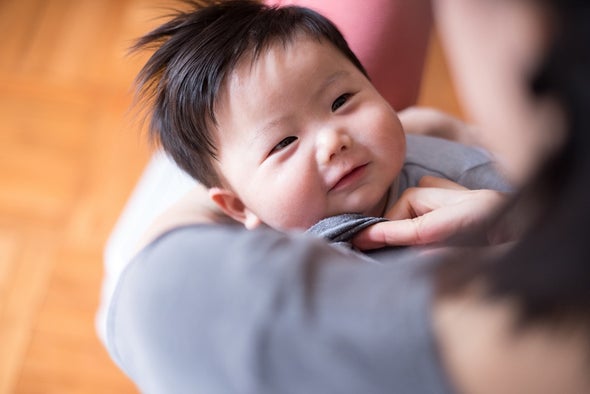(单词翻译:单击)
听力文本
This is Scientific American — 60-Second Science. I'm Christopher Intagliata.
A baby's laugh is unmistakable: (CLIP: baby laughter) But aside from its squealing, high-pitched quality, there's another factor that sets a baby's laugh apart from ours: babies laugh on the exhale AND the inhale. Whereas adult humans "tend to laugh predominantly on the exhale. The classic kind of ha-ha-ha." Disa Sauter, a psychologist who studies emotions at the University of Amsterdam. Sauter and her colleagues collected 44 samples of babies laughing, from the ages of 3 months... (CLIP: 3 months) to 10 months... (CLIP: 10 months) all the way up to 18 months. (CLIP: 18 months)
They played the samples for about 100 untrained volunteers, and asked them to deconstruct the laughs. Were the babies laughing on the inhale, the exhale, or both? "And there we find a nice relationship between the age of the baby and the amount of the laughter happening on the inhale." The younger the baby, the more laughs on the inhale. Because remember, our laughs gravitate towards the exhale as we age. And Sauter thinks one reason for that could be that we gain more vocal control as we learn to talk: because speaking also happens primarily on the exhale.

She presented the preliminary findings at a meeting of the Acoustical Society of America, in Victoria, Canada.
The researchers are in the process of checking the judgments of the volunteers against those of professional phoneticians. As it happens: human babies aren't the only primates who laugh both breathing out and breathing in. (CLIP: chimp) Chimps do it too."They go like hoo hoo hoo. You know, they laugh more continuously while inhaling and exhaling. But it's... yeah, true, it's totally difficult to do on purpose." But Sauter, I thought, pulled off a pretty good impression. "I'll take that as a compliment! (laughs)"
Thanks for listening for Scientific American — 60-Second Science. I'm Christopher Intagliata.
参考译文
这里是科学美国人——60秒科学。我是克里斯托弗·因塔利亚塔。
婴儿的笑声不会被认错:(音频片段:婴儿的笑声)但除了声音尖细而且音调高等特点外,还有一个因素能将婴儿的笑声和我们成人的笑声区分开,那就是:婴儿在呼气和吸气时都可以笑。而成人“主要是在呼气时发笑。典型的笑声就是‘哈哈哈’。”阿姆斯特丹大学研究情感的心理学家迪萨·索特说到。索特和同事收集了44个婴儿笑声样本,婴儿年龄从3个月(音频片段:3个月大婴儿的笑声)到10个月(音频片段:103个月大婴儿的笑声)一直到18个月(音频片段:18个月大婴儿的笑声)。
他们向约100名未经训练的志愿者播放了这些婴儿笑声样本,并让志愿者分析这些笑声。婴儿是在吸气时发笑还是在呼气时发笑,或是在吸气和呼气时都会笑?“我们由此发现了婴儿年龄和吸气发笑次数的确切关系。”婴儿月份越小,吸气时发笑的次数就越多。要记住,这是因为随着年龄的增长,我们会逐渐变成呼气时发笑。索尔认为,其中一个原因可能是,我们在学习说话时会获得更多的声音控制能力:说话也主要是在呼气时进行的。
她在加拿大维多利亚市举行的美国声学学会会议上介绍了她的初步研究发现。
研究人员正在将志愿者的判断与专业语言学家的判决进行核对。巧合的是:人类婴儿并不是唯一在呼气和吸气时都会笑的灵长类动物。(音频片段:黑猩猩的笑声)黑猩猩也会如此。“它们的笑声是‘呼呼呼’。它们在吸气和呼气时都发笑,笑声才更连贯。故意这样做可就太难了。”不过我认为,索特成功地给人们留下了非常好的印象。“我会把这视为一种恭维!(笑)”
谢谢大家收听科学美国人——60秒科学。我是克里斯托弗·因塔利亚塔。
译文为可可英语翻译,未经授权请勿转载!
重点讲解
重点讲解:
1. aside from 除…外(尚有);此外;
I didn't accept the job because it was badly paid and aside from that, it wasn't very interesting.
我没接受这个工作,因为工资既少,又非常乏味。
2. breathe out 呼出;呼气;
Breathe out and ease your knees in toward your chest.
呼气,膝部放松向胸部靠拢。
3. breathe in 吸入;吸气;
She breathed in deeply.
她深深地吸了口气。
4. pull off 成功完成,做成(困难的事情);
It will be a very, very fine piece of mountaineering if they pull it off.
如果他们能成功,那将是一次非常了不起的登山壮举。


